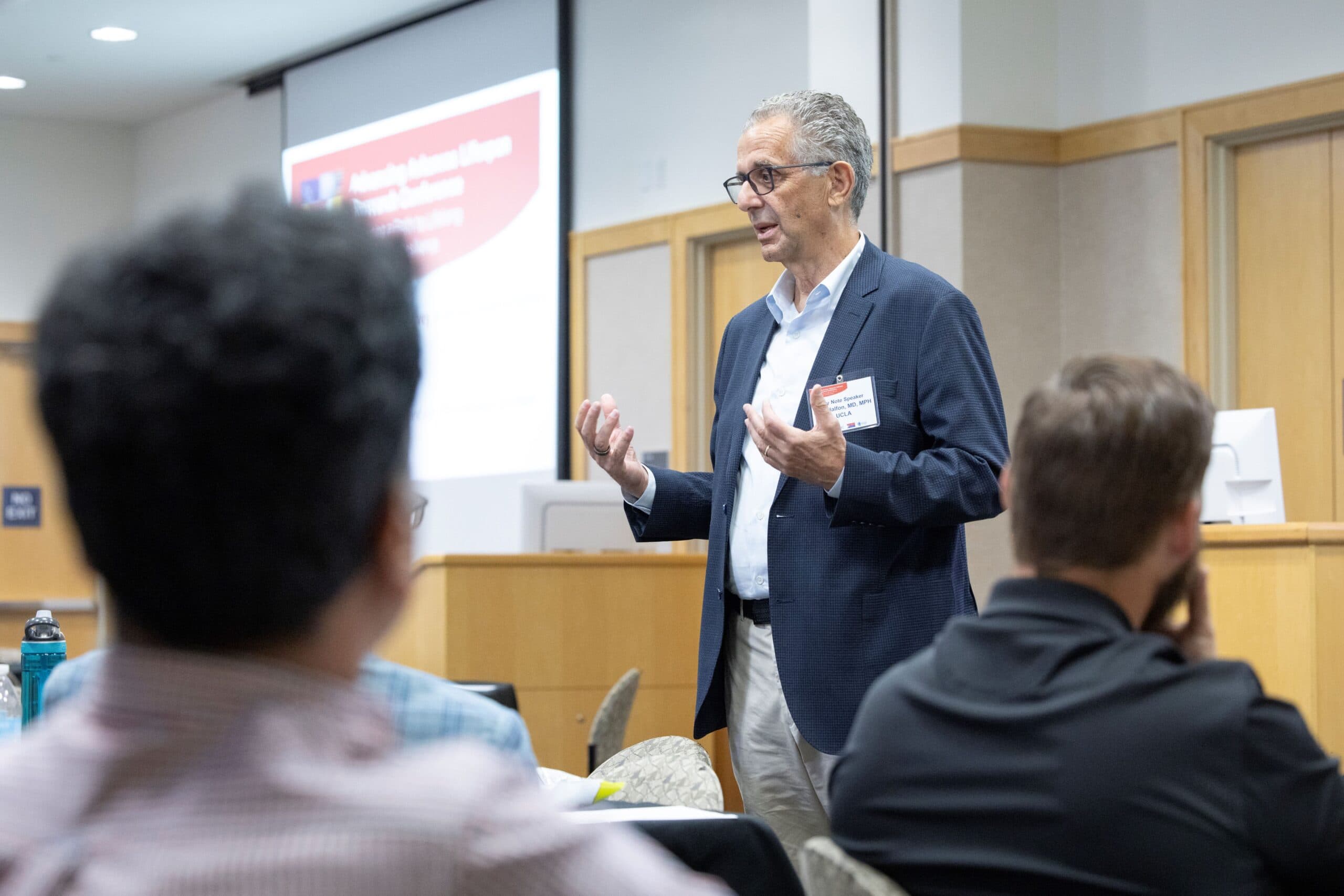Research Leader Tells Conference Attendees that Networks Are Key to Solving ‘Wicked’ Health Problems
| Lifespan research may span cradle to grave, but for Neal Halfon, M.D., MPH, the top priority is addressing complex problems that often begin prenatally, preventing children from thriving and leading to long-term health issues.
A major thought leader in children’s health policy and health system change from the University of California, Los Angeles (UCLA), Halfon discussed his work as the keynote speaker at the Sept. 10 Advancing Arkansas Lifespan Research Conference, which drew more than 70 attendees. The second annual conference was sponsored by the Arkansas Children’s Research Institute (ACRI), UAMS Translational Research Institute, and the College of Medicine Lifespan Creativity Hub. Halfon’s presentation was titled, “Life Course Health Development: A Sensemaking Framework for Translational Research.”
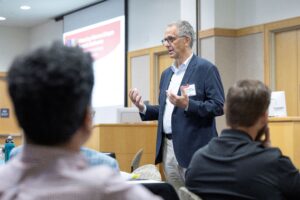
Neal Halfon, M.D., MPH, speaks to attendees of the Advancing Arkansas Lifespan Research Conference. (Photo by Karen Segrave)
“The problems we face as a society are what are called wicked problems,” said the distinguished professor of pediatrics, public health and public policy, and founding director of the UCLA Center for Healthier Children, Families & Communities. “They’re complex problems; they’re nonlinear; they’re emergent, complex, and multi-level problems. A single investigator is not going to solve that.”
He noted that despite remarkable medical advances that improve childhood morbidity and mortality, there have been dramatic increases in chronic health problems, a growing prevalence of mental health disorders, and an increasing number of children with multiple conditions, such as asthma, obesity and attention-deficit/hyperactivity disorder (ADHD). In addition, there’s been an emergence of new disorders, including internet addiction disorder.
When it comes to such complex problems, he said, one person will solve it about 2% of the time, a team of people will solve it 25% of the time, and a network can succeed about 60% of the time.
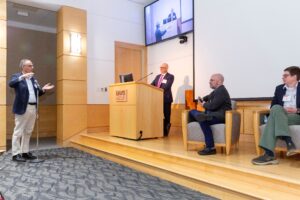
Neal Halfon, M.D., MPH (left), posed questions to featured speakers during a conference panel discussion, moderated by Peter Mourani, M.D. (center), president of the Arkansas Children’s Research Institute. The panel included Colin Kay, Ph.D. (second from right), professor of pediatrics, and David Matlock, M.D., an assistant professor of pediatrics. (Photo by Karen Segrave)
“You need to have that collective intelligence,” said Halfon, also director of Maternal Child Health Life Course Interventions & Translational Research Networks at UCLA.
Halfon is working to tackle the systemic health challenges through the programs he leads, such as the Life Course Translational Research Network, which includes 125 researchers across 19 states and more than 40 institutions across the U.S.
The network includes seven research nodes focusing on adversity, ADHD, early childhood, family, maternal health, prematurity and schools.
Halfon and his colleagues published the “Handbook of Life Course Health Development” in 2018. The network’s collaborators also published 18 papers as a supplement to the journal Pediatrics in 2022, in which the authors discuss moving the network-developed concepts into practice.
Successfully addressing the country’s complex health issues will require transforming the health care system, with significant investments aimed at helping children to thrive, he said.
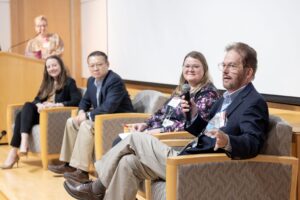
Dennis Sullivan, M.D., (right), responds to a question during a panel discussion. Also pictured are (l-r), Laura James, M.D., Katy Allison, Ph.D., MPH, Yong Zhu, Ph.D., and Lorraine McKelvey, Ph.D. (Photo by Karen Segrave)
Clinical and Translational Science Award institutions such as UAMS can play a big role.
“We think there are lots of touch points between what we’re doing and the clinical and translational science award (CTSA) institutions,” Halfon said. “We’re encouraging other CTSAs to get involved with us.”
He noted that the network invites up to 10 junior faculty and Ph.D. students each year to participate in its two-year training program, with the scholars coming from clinical and translational science award institutions across the U.S.
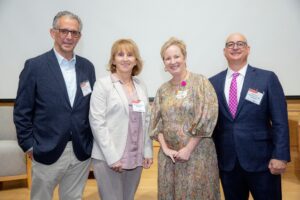
Neal Halfon, M.D., MPH (left), with the conference’s leaders: Elisabet Borsheim, Ph.D., Laura James, M.D., and Peter Mourani, M.D. (Photo by Karen Segrave)
During a discussion with attendees at the end of the day, Halfon complimented the other presentations and panel discussions.
“I found all the discussion today really, really fascinating,” he said. “This was quite a diverse group of topics.”
Other presenters represented research at UAMS, Arkansas Children’s Research Institute (ACRI) and the Central Arkansas Veterans Healthcare System (CAVHS). The researchers and their presentation titles were:
Katy Allison, Ph.D., MPH, assistant professor, Fay W. Boozman College of Public Health Department of Health Behavior and Health Education; The Role of Remote Patient Monitoring in Improving Perinatal Outcomes
Elena Ambrogini, M.D., Ph.D., associate professor, College of Medicine; director, Division of Endocrinology and Metabolism, Department of Internal Medicine; associate professor, Department of Orthopaedics; staff endocrinologist and research scientist, CAVHS; Role of Oxidized Phospholipids in Bone Homeostasis
Aline Andres, Ph.D., RD, professor, College of Medicine Department of Pediatrics; associate director, Arkansas Children’s Nutrition Center; Perinatal Interventions to Influence Lifespan Health
Colin Kay, Ph.D., professor, College of Medicine Department of Pediatrics; Leveraging Nutrition Research Data for Supporting Precision Health
David Matlock, M.D., assistant professor, Department of Pediatrics, Division of Neonatology; Bronchopulmonary Dysplasia and Respiratory Distress Syndrome of the Newborn
Lorraine McKelvey, Ph.D., professor, College of Medicine Department of Family and Preventive Medicine; Following Baby Back Home: Examining Impacts of Home Visiting for NICU Graduates
Dennis H. Sullivan, M.D., director of the VISN 16/CAVHS Geriatric Research Education and Clinical Center; professor and vice chair, Donald W. Reynolds Department of Geriatrics, College of Medicine; Select Aging-Focused Research at the VA
Yong Zhu, Ph.D., professor of Epidemiology, Fay W. Boozman College of Public Health, and associate director for Population & Translational Sciences, Winthrop P. Rockefeller Cancer Institute; Circadian Disruption and Human Health
